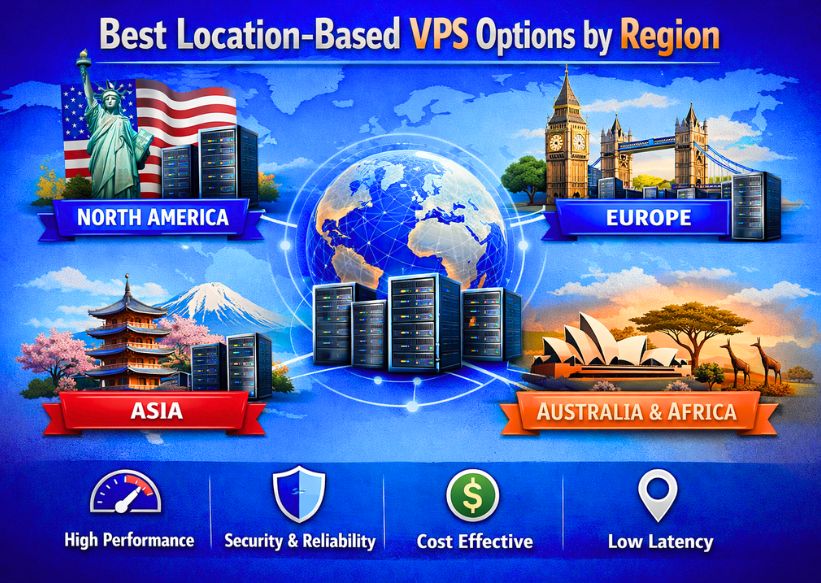
Hosting Solutions for Freelancers and Solo Entrepreneurs- Full Guide For Beginner
- By Anis Ur Rahman
- 28 Jul, 2025
As a freelancer or solo entrepreneur, your online presence is your business lifeline. Whether you're showcasing your portfolio, running client projects, or managing an e-commerce store, the right hosting sets the foundation for your website’s performance. There are dozens of hosting choices out there, but finding the perfect fit for your specific needs, budget, and technical expertise requires careful consideration.
Let’s break down what you need to know to navigate through different hosting types, understand cost implications, and select the ideal hosting solution that grows with your freelance business. From shared hosting for beginners to scalable cloud solutions for expanding entrepreneurs, we'll cover everything you need to choose wisely based on your needs.
What is Web Hosting for Freelancers?
Web hosting stores your website's files on robust servers, enabling users to access it over the internet. For freelancers and solo entrepreneurs, hosting serves multiple purposes: it's your digital storefront, portfolio showcase, client communication hub, and often your primary business tool.
Unlike enterprise hosting needs, freelancer hosting requirements are unique. You need affordable solutions that don't compromise on performance, easy-to-manage control panels, and the flexibility to scale as your business grows. Most importantly, you need reliable uptime because every minute your site is down could mean lost clients or revenue.
Common freelancer hosting use cases include:
- Portfolio websites and personal blogs
- Client project demonstrations
- E-commerce stores for digital products
- Email hosting for professional communication
- Customer support and booking systems
Types of Hosting Solutions for Freelancers
Shared Hosting: The Budget-Friendly Starting Point
Shared hosting is where multiple websites share server resources, making it the most affordable option for new freelancers. Your website shares CPU, RAM, and storage with dozens of other sites on the same server
Best for: Freelancers just starting, simple portfolio sites, blogs with moderate traffic.
Advantages:
- Extremely affordable ($2-10/month)
- No technical maintenance required
- Pre-installed control panels (cPanel/Plesk)
- Perfect for WordPress sites
Disadvantages:
- Limited resources and performance
- Potential slowdowns from neighboring sites
- Fewer customization options
- Security depends on other users' practices
VPS Hosting: The Middle Ground Solution
With VPS hosting, you get a slice of a physical server that acts like your own private space. You get guaranteed RAM, CPU, and storage allocation, offering better performance than shared hosting at a reasonable price.
Best for: Growing freelance businesses, client-heavy portfolios, and small e-commerce stores.
Key benefits:
- Dedicated resources guarantee
- Root access for advanced users
- Better security isolation
- Scalable resource allocation
- Price range: $10-50/month
Learn More: Cheap VPS Hosting in Bangladesh: Complete Guide for 2025
Get More: Shared vs. VPS Hosting: Which is Better for Bangladesh?
Cloud Hosting: Scalability and Reliability
Cloud hosting utilizes a network of interconnected servers to host your website, ensuring reliable uptime and flexible scalability. Resources can be adjusted in real-time based on your traffic and performance needs.
Ideal for: Freelancers with variable traffic, growing online stores, and mission-critical websites.
Advantages:
- Pay-as-you-use pricing model
- Excellent uptime and redundancy
- Instant resource scaling
- Global content delivery networks
- Advanced backup and recovery options
Learn More: Best Cloud Hosting in Bangladesh – Compare Features & Find the Right One (2025)
Dedicated Hosting: Maximum Control and Performance
A dedicated server allocates the entire physical server solely to you, delivering unmatched performance, total control, and advanced security.
Suitable for: Established solo entrepreneurs, resource-intensive applications, and high-traffic websites.
When to consider dedicated hosting:
- Handling 10,000+ daily visitors
- Running complex applications
- Requiring specific server configurations
- Managing sensitive client data
Learn More: Best Dedicated Server Hosting in Bangladesh-Best guide in 2025
Specialized Hosting Solutions for Freelancers
Managed WordPress Hosting
Managed WordPress hosting is specifically optimized for WordPress sites, offering automatic updates, enhanced security, and WordPress-specific support.
Perfect for: Best suited for freelancers using WordPress or content-heavy sites, bloggers.
Features include:
- Automatic WordPress updates and backups
- Enhanced security measures
- WordPress-optimized performance
- Expert WordPress support
- Staging environments for testing
Learn More: WordPress Hosting Guide 2025: Finding Your Perfect Web Host
Portfolio Hosting Platforms
Some hosting providers offer specialized portfolio hosting with built-in templates, client galleries, and project management tools.
Benefits for creative freelancers:
- Professional portfolio templates
- Client proofing and approval systems
- Integrated payment processing
- Mobile-responsive designs
- SEO optimization tools
Budget Considerations and Cost Management
Understanding Hosting Costs
Hosting costs extend beyond the monthly fee. Factor in domain registration, SSL certificates, email hosting, backup services, and potential overage charges.
Typical cost breakdown:
- Shared hosting: $36-120/year
- VPS hosting: $120-600/year
- Cloud hosting: $60-1200/year (variable)
- Managed WordPress: $100-500/year
Hidden Costs to Watch For
Many hosting providers advertise low introductory prices but include hidden costs:
- Setup fees for new accounts
- Domain registration renewal rates
- SSL certificate charges
- Email hosting add-ons
- Backup and restore services
- Migration assistance fees
Money-Saving Tips
Save more on web hosting by choosing yearly plans instead of monthly payments—often 20–40% cheaper..
Bundle services: Look for packages including domain, email, and SSL certificates.
Monitor resource usage: Avoid overpaying for unused resources by regularly reviewing your hosting needs.
Don’t miss out on welcome discounts: Many providers offer significant discounts for new customers.
Essential Features for Freelancer Hosting
Performance and Speed
Fast loading speeds are crucial for freelancer websites. Slow-loading websites can frustrate users and harm your SEO performance.
Key performance factors:
- SSD storage for faster data access
- Content Delivery Network (CDN) integration
- Server location proximity to your audience
- Caching mechanisms
- HTTP/2 and PHP 7+ support
Security Features
Safeguarding your website and client data must remain a top priority.
Essential security features:
- Free SSL certificates
- Regular automated backups
- Malware scanning and removal
- DDoS protection
- Secure file transfer protocols
- Two-factor authentication
Scalability Options
Your hosting should grow with your business without requiring complete migrations.
Scalability considerations:
- Easy plan upgrades
- Resource monitoring tools
- Bandwidth and storage flexibility
- Multi-site hosting capabilities
- E-commerce integration options
See More: Key Features to Consider in a Cheap Hosting Plan- Full Guide For Beginner
Selecting the Right Hosting Provider
Key Selection Criteria
Uptime guarantee: Look for providers offering 99.9% uptime guarantees with compensation for downtime.
Customer support: 24/7 support through multiple channels (chat, phone, email) is essential for freelancers who can't afford extended downtime.
Control panel usability: User-friendly interfaces like cPanel or custom dashboards save time on routine tasks.
Migration assistance: Free website migration services help you switch providers without technical hassles.
Explore: Top 10 best hosting provider in Bangladesh
Questions to Ask Potential Providers
1. What's included in backup and restore services?
Most hosting providers offer automated daily or weekly backups that include your website files, databases, email accounts, and configurations. Restore options typically allow you to recover your site with a single click from a control panel or upon request. Premium plans may include off-site backups, version history, and manual backup scheduling.
2. How do you handle traffic spikes?
To manage sudden traffic surges, reliable hosts use auto-scaling, load balancing, or burstable resource allocation. VPS and cloud hosting plans are usually equipped to handle spikes better than shared hosting. Some providers also offer traffic spike protection or CDN integration to distribute load efficiently without downtime.
3. What security measures are implemented?
Standard security features include firewalls, malware scanning, DDoS protection, SSL certificates, server monitoring, and two-factor authentication. Higher-tier plans may offer WAF (Web Application Firewall), automatic patching, and isolated environments for enhanced protection.
4. Are there any usage limitations or penalties?
Yes, most hosting plans come with fair usage policies. Exceeding limits on bandwidth, storage, or CPU usage may lead to throttling, temporary suspension, or upgrade recommendations. Be sure to check the Terms of Service or Acceptable Use Policy to understand these thresholds clearly.
5. How quickly can resources be scaled?
With VPS or cloud hosting, resources like RAM, CPU, and storage can often be scaled instantly or within minutes through the hosting dashboard. Shared hosting typically requires manual plan upgrades, which might take a few hours, depending on the provider.
Setting Up and Managing Your Hosting
Initial Setup Best Practices
Protect your account by activating two-factor authentication and setting a strong, unique password.
Configure backups: Set up automated daily backups to protect your work.
Install SSL certificates: Ensure all client interactions are encrypted.
Set up email hosting: Create professional email addresses using your domain.
Ongoing Maintenance
Regular maintenance keeps your hosting environment secure and performant:
- Monitor website performance and uptime
- Review security logs and backup integrity
- Update software and plugins regularly
- Optimize database performance
- Monitor resource usage and costs
To dive deeper into building your online presence, explore our detailed resource: Cheap Domain Hosting for Small Businesses in Bangladesh – A Complete Guide (2025)
Conclusion: Making the Right Choice for Your Freelance Success
Selecting the right hosting solution is a crucial investment in your freelance business's future. Start with shared hosting if you're new to freelancing, then scale to VPS or cloud hosting as your business grows. Consider managed WordPress hosting if you're building primarily on WordPress, and don't overlook the importance of reliable support and security features.
Remember that the cheapest option isn't always the best value. Factor in your time, technical skills, and business requirements when making your decision. A slightly more expensive hosting plan that saves you hours of technical troubleshooting often pays for itself in increased productivity and peace of mind.
Pick a hosting service that fits your needs now and can grow with you. Whether you're just starting your freelance journey or scaling an established solo business, the right hosting foundation will support your success and help you focus on what you do- deliver excellence to your clients while expanding your business.
Take time to evaluate your specific requirements, compare providers carefully, and choose a hosting solution that empowers your freelance success rather than limiting it.

Author By
Anis Ur Rahman
Anis Ur Rahman writes domain and web hosting–related articles on behalf of Ummah Host BD. He works with domain name selection, web hosting, BDIX hosting, and website performance, and creates informational guides based on practical experience to help users make informed decisions. His writing focuses on providing reliable, easy-to-understand, and decision-supportive content.
Search Blog
Categories
Latest News

15 Feb, 2026

13 Feb, 2026







